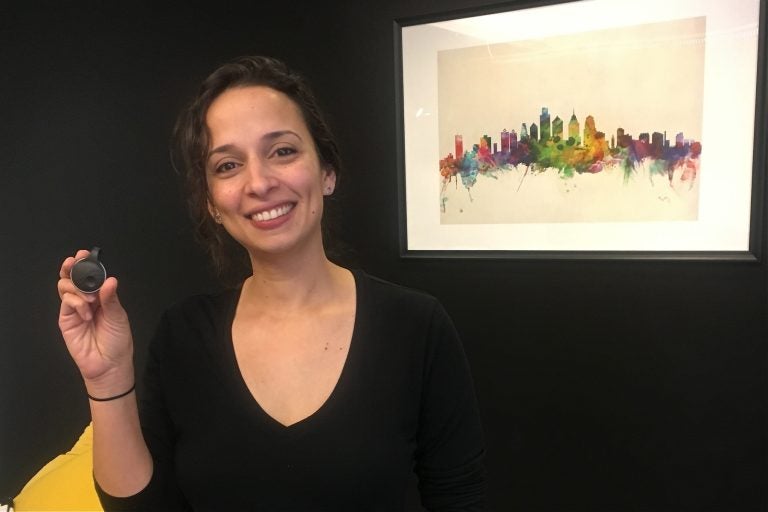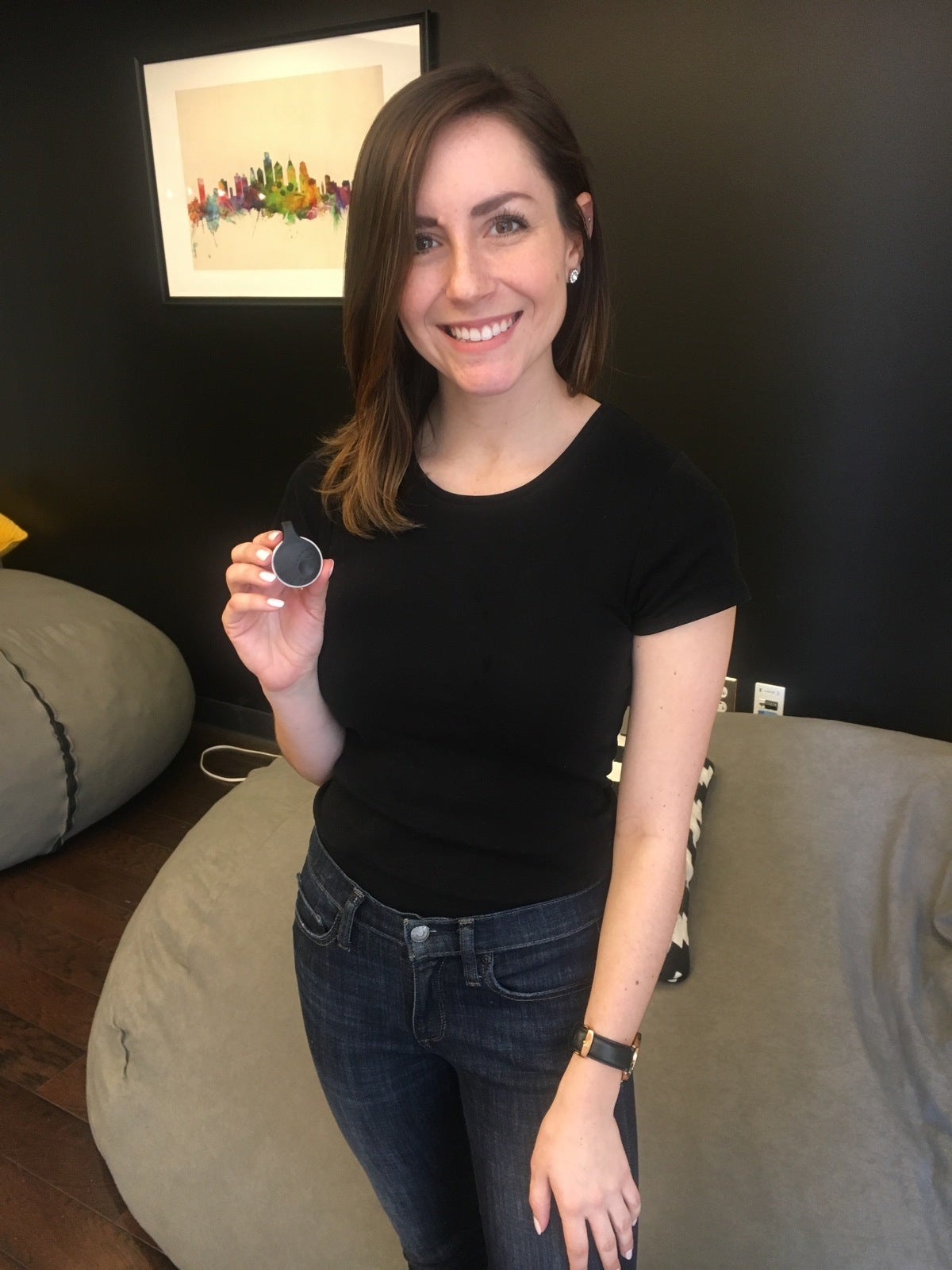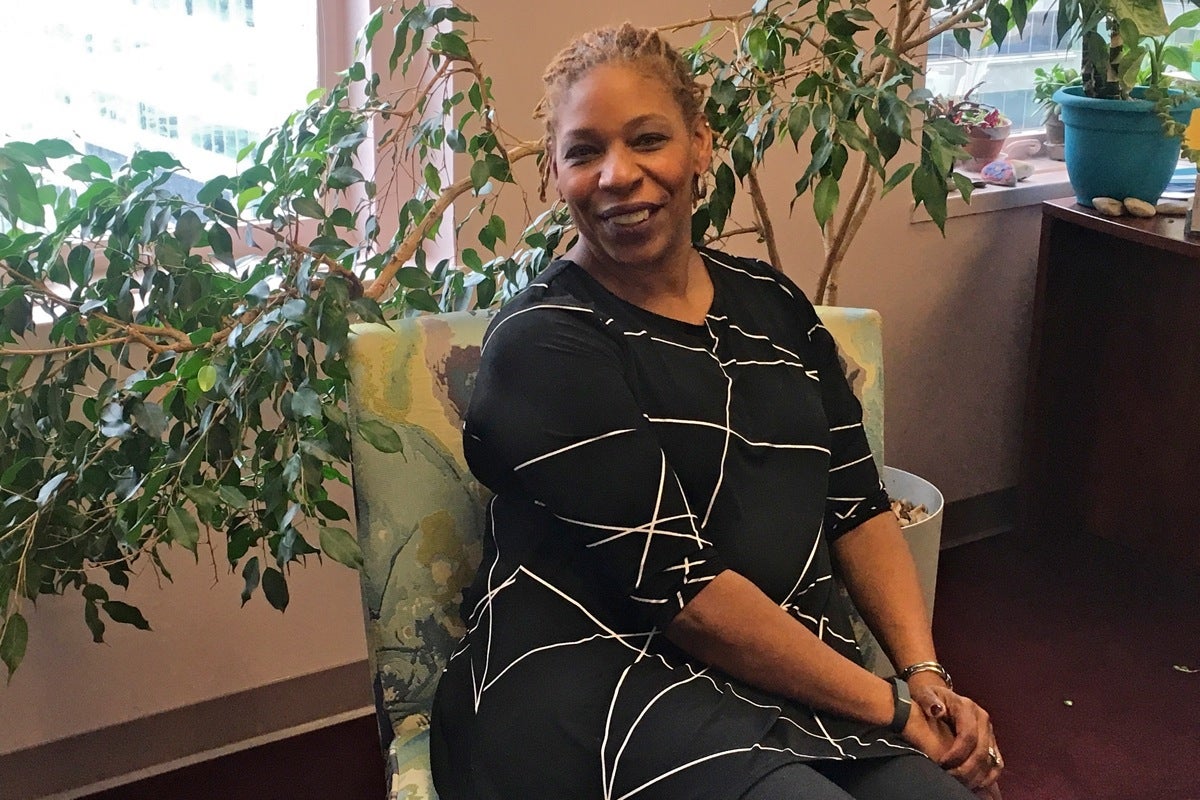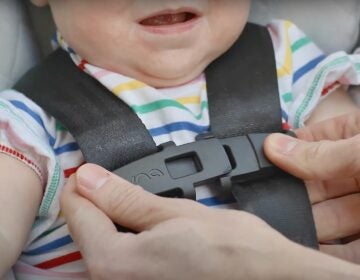With ‘culture of consent’ still work in progress, Philly woman markets wearable distress signal
Philadelphia entrepreneur Yasmine Mustafa took a trip that inspired her own effort to protect women from sexual assault.

ROAR for Good's CEO, Yasmine Mustafa, created Athena after hearing sexual assault stories while traveling in South America. (Jasmine M. Ellis for WHYY)
Seven years after activist Tarana Burke first launched the “Me Too” campaign — and four years before the #MeToo movement ignited social media — Philadelphia entrepreneur Yasmine Mustafa took a trip that inspired her own effort to protect women from sexual assault.
While backpacking by herself across South America for six months in 2013, Mustafa heard #MeToo stories all along her journey. Traveling alone allowed her to get to know other travelers and locals, and through these interactions, they would exchange stories about the private moments in their lives.
“As incredible as it was, it was also an eye-opening experience for me because, everywhere that I went and visited, I kept hearing stories or listening to women share stories — their own #MeToo stories, if you will … about a time they had been attacked, abused or harassed,” Mustafa said. “I was just blown away by how consistent it was, no matter how many places I went to and how many people that I talked to.”
Mustafa spent a month in Ecuador, Colombia, Argentina, Chile, Bolivia, and Peru, and returned to Philadelphia toward the end of 2013. One week later, Mustafa’s neighbor was walking out to her car when she was grabbed from behind and dragged into an alley where she was beaten and sexually assaulted. That was the moment Mustafa knew she wanted to do something.
When Mustafa left for South America, she had already sold her first tech company. After she returned, she called her friend Anthony Gold — they met when Gold joined a health care company she was consulting with — and they set to work on a self-defense product.
“I called him to catch up, and, when I shared the story of my neighbor and how I had heard similar stories from my trip, he said he wanted to help,” she said. “That’s when we joined forces.”
Their first idea was to put mace or pepper spray in a bracelet — they called it “the Macelet” — but after doing research and talking to experts, they realized that wasn’t a good plan.
“We know that from talking to these women, they want something that can’t be used against them,” Mustafa said.
So Mustafa and Gold went back to the drawing board. They wanted to make something women wouldn’t have to search for in their pockets or purses.
“Something discreet, something that can help deter an attack, something that can message for help,” Mustafa said.
Next, they came up with a wearable emergency button, small enough to fit in the palm of your hand. When pressed, the button emits a piercing sound that reaches 95 decibels and sends a text message with the user’s location to people in their contacts. They called it “Athena.”

Mustafa is now the CEO of the Philadelphia-based startup ROAR for Good that launched Athena last year after a successful crowdfunding effort.
It’s one of several products on the market aimed at harnessing technology to protect women from sexual violence, including Go Guarded (a ring with a serrated plastic edge); Revolar (a panic button); and Safelet (a bracelet with a panic button that alerts the user’s “SOS network”).
Manisha Mohan, a scientist at MIT’s Media Lab, invented Intrepid — a wearable sticker she says can detect a physical assault and record data, including the time and location, as well as audio of the incident. It also contacts people in the victim’s “safety circle.” Mohan and her collaborators have not released the product to the public yet, but she hopes it can arm women with the necessary evidence to help prosecute their attackers.
“Intrepid tries to empower the silent #MeToo,” Mohan said. Intrepid “aims at making those voices louder and bolder by giving them legal evidence to back up their cases.”
Philadelphia resident Jessie Evarts uses Athena during her morning runs and when she’s out at night.
“It definitely makes me feel safer, at least psychologically, knowing that I have something that I can go to if something were to happen,” she said. “I have my parents as my alert on there, and it makes them feel better as well. As a young woman, living in the city, not at home, they are obviously very nervous with me walking around and doing stuff alone. So it makes them feel a lot better.”
However, critics of these products say they reinforce a dangerous dynamic that puts the burden on women to protect themselves, rather than holding men accountable for their behavior.
Mustafa and Gold say they’ve thought about that. The company’s ROAR Back Program donates a portion of every sale to “nonprofits teaching consent, healthy relationships, and empathy to young children,” said Mustafa.
“We call these women’s issues,” Gold said. “These aren’t women’s issues. They’re societal issues. But, more specifically, 99.9 percent of these issues are men. And so the challenge that we have is having more men stepping up and saying, ‘It’s on us. The issue is on us. We need to make a difference.’ ”

Monique Howard is executive director of Philadelphia-based Women Organized Against Rape or WOAR, which is honoring ROAR For Good with its Bridge of Courage award this month.
Howard said she supports anything that can help empower victims or potential victims of sexual violence and shift “to a culture of consent.”
“As we look at the culture that we live in right now, the culture of rape, and trying to move us toward a culture of consent and using education, using prevention programming, and mobilizing the community, there needs to be something else,” Howard said. “We live in a technology world and, that something else, it makes sense that it is technology.”
Mustafa said she hopes that one day, women will no longer need products like hers.
“Pepper spray, Tasers, Athena — all of them are a Band-Aid to the real problem,” she said. “They provide short-term benefits, but, in the long term, they will not end sexual assault. Education like consent/empathy training, men becoming allies and learning about the dangers of masculine fragility, and society as a whole not tolerating women being treated as objects will make a bigger impact.”
WHYY is your source for fact-based, in-depth journalism and information. As a nonprofit organization, we rely on financial support from readers like you. Please give today.




